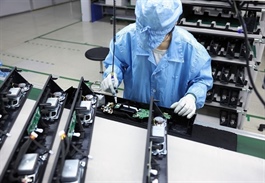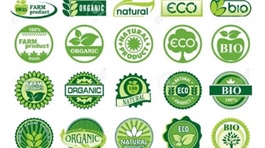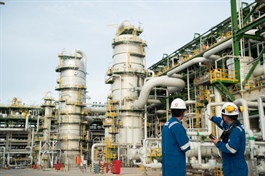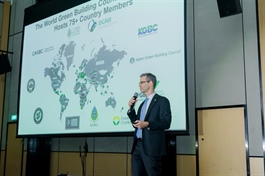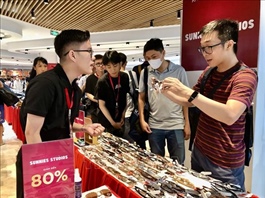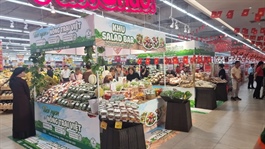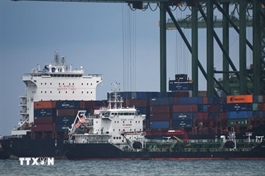Retailers continue march towards plastic-free future
Retailers continue march towards plastic-free future
Eliminating plastic bags and single-use plastics has become an essential strategy for retailers to adapt to green consumption trends and enhance their appeal to customers.
At a conference on promoting the circular economy in retail three weeks ago, Kim Thi Thuy Ngoc, head of Science and International Cooperation at the Institute of Strategy and Policy on Agriculture and Environment (ISPAE) reported that more than 62,000 plastic bags, equivalent to nearly 550kg, were removed in just six days during a no-plastic bag day campaign, held in early July.
“Retailers have simultaneously replaced non-biodegradable bags with environmentally friendly alternatives, launched promotions to encourage customers to bring their own bags, and widely communicated sustainable consumption practices,” Ngoc said. “I am confident that with the strong commitments of retail units and the support of partners in reducing plastic waste, we will together contribute to national, regional, and global efforts towards a global treaty to end plastic pollution.”
The initiative, now in its third year, has seen participation from over a dozen retailers, including names such as Central Retail, Lotte Mart, AEON Vietnam, Co.opmart, MM Mega Market, and TH true MART.
Among the most notable activities were Central Retail’s month-long no-plastic bag campaign in Hue, AEON Vietnam’s no-plastic day programme, Co.opmart’s incentives for customers who bring reusable bags, and TH true MART’s exhibitions and art photography themed around environmental protection.
These retailer-led efforts mirror a broader national push, with Hanoi emerging as a key battleground in the fight against plastic waste.
A report on single-use plastic bag consumption in Hanoi’s supermarket chains by ISPAE indicates that plastic bags account for 38.5 per cent of the total weight of plastic waste in Hanoi, with 104,000 free plastic bags are distributed daily, amounting to approximately 38 million bags a year. Most of these bags are used once and disposed of in landfills.
To mitigate this issue, Hanoi People’s Council passed a resolution in mid-July to reduce plastic waste in production, commerce, services and daily life. From 2027, markets and convenience stores will no longer provide free non-biodegradable plastic bags. By 2028, they will cease the sale and use of single-use plastic products and non-biodegradable packaging, including expanded polystyrene.
Nguyen Thi Huong, deputy head of Solid Waste Management at Hanoi Department of Agriculture and Environment, stated that Hanoi is among the pioneering localities combating plastic waste, having issued an implementation plan since 2018.
“Hanoi People’s Council set out objectives to reduce plastic waste in production and consumption and ensures strict management of the import and use of plastic materials, especially recycled and biodegradable plastics,” she noted.
According to Huong, Hanoi plans to conduct surveys in over 120 wards to monitor waste generation, controlling it from raw material intake through the production process to consumption. The city aims to launch an anti-plastic waste movement with extensive communication to the public and businesses, alongside activities to support and encourage the production of environmentally friendly products.
Chalermchai Pornsiripiyakool, director of International Relations at Central Retail Vietnam, noted that the company has made strong commitments to biodegradable plastics. Retail outlets have piloted packaging changes from plastic foam to environmentally friendly materials like paper bags and biodegradable options, maintaining stable prices to avoid burdening customers. Central Retail has initiated numerous campaigns to promote a green lifestyle and limit plastic use, along with installing plastic bottle collection machines.
“We have partnered with nearly 30 suppliers of fresh produce to replace plastic packaging with biodegradable alternatives,” Chalermchai said. “Central Retail, with its BigC, Tops Market, and GO! supermarket chains, aims to replace all plastic products with biodegradable solutions in 18 outlets this year and across the entire chain by the end of 2026.”
Similarly, at Lotte Mart, sugarcane trays for processed and fresh foods have been in use since 2020. The supermarket system has adopted biodegradable plastic bags and is researching paper materials for packaging fruit and vegetables. This supermarket chain will implement preferential programmes for customers using reusable bags starting next month.
Despite proactive initiatives by retailers to minimise plastic waste and boost the circular economy, many report that sourcing clean recycled plastic remains a significant challenge.
Le Thi Hong Nhi, deputy general director of Unilever Vietnam, emphasised that while there are legal regulations regarding waste classification at source in Vietnam, the infrastructure and implementation conditions are not yet synchronised, impacting the cleanliness of raw material inputs and resulting in higher processing costs.
Technology within the recycling plastics industry remains limited, with few recyclers capable of producing goods that meet quality standards and safety measures similar to those of virgin plastics. Consequently, recycled plastic tends to be approximately 20 per cent more expensive than virgin plastic.
“To address these challenges, Unilever has ramped up efforts to raise awareness about waste classification at source and collaborates with domestic recycling partners to improve plastic properties. We are also focusing on procuring recycled plastic products that meet standards and supporting waste collection initiatives,” she stated. “However, for the recycling industry to thrive sustainably, government support is essential, especially through preferential mechanisms and investments from the Vietnam Environmental Protection Fund.”
According to PRO Vietnam’s Source Waste Classification report in 2024, 73 per cent of Vietnamese people are concerned about environmental issues, and 57 per cent often bring reusable bags when shopping. Notably, 54 per cent of Vietnamese consumers are willing to pay an additional 10 per cent on average for products made from sustainable recycled materials.
A Retail Bulletin published in February indicated that nearly one-third of consumers view environmental friendliness as the most crucial factor when shopping. Retailers adopting a circular economy can enhance customer trust, improve retention, and create new revenue streams through services like take-back programmes, recycled sales, and sustainable packaging solutions.
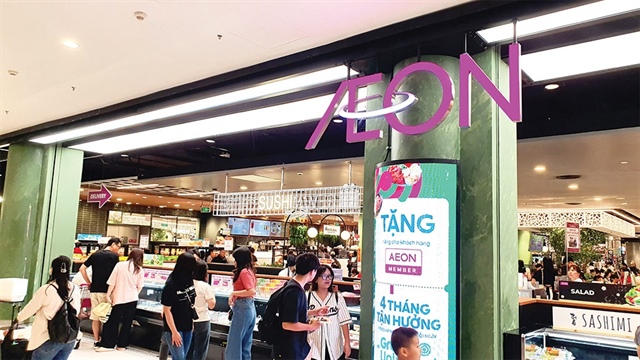
AEON continuously offers initiatives to persuade customers to use less plastic, photo Le Toan |
Nguyen Trung Thang, deputy director, ISPAE
Vietnam has made strong commitments to boosting the circular economy. In particular, the construction and promulgation of a system of policies related to the circular economy are increasingly being emphasised and identified as a key task in the process of achieving sustainable development. Specifically, the Law on Environmental Protection passed in 2020, has dedicated Article 142 to regulate the development of the circular economy.
To effectively implement the provisions of the law, in 2022, the government issued criteria, a roadmap, and incentives for circular economy models. Earlier this year, a national action plan was outlined for implementing the circular economy, clearly defining the strategic direction and priorities for developing the circular economy in priority sectors and fields.
In addition, Vietnam has also issued many legal documents to control plastic waste and promote sustainable production and consumption. Specifically, the national strategy on integrated solid waste management with a vision to 2050; a 2020 directive on strengthening the management, reuse, recycling, treatment and reduction of plastic waste; and the 2021 approval of a scheme on strengthening the management of plastic waste in Vietnam, which identifies specific goals and targets for reducing plastic waste generation.
In this context, ISPAE has been at the forefront of implementing practical initiatives to support the retail sector in the green transition. ISPAE has been a partner in the ‘No Plastic Bag Day’ campaign since 2023, connecting a network of retailers to share experiences and spread the message of green living. Additionally, a project funded by the EU since 2020 has also contributed to establishing an alliance of retailers committed to minimising plastic waste throughout the supply chain.
Tran Thi Hien Hanh, expert, Department of Environment Ministry of Agriculture and Environment
Green transformation must come from two factors, technology and mindset. Using recycled products is the most reasonable solution at the present time, as the use of biodegradable packaging has not yet brought about a significant change in mindset, nor has it gained a competitive advantage in terms of cost for retail businesses. Using reusable bags and packaging will lead to significant changes because whether the products are easily biodegradable or not, the amount of waste going into the environment will still be reduced.
However, there are currently two groups of products being considered for labelling: biodegradable packaging and packaging made from recycled plastic pellets. While biodegradable packaging has environmental benefits, its current cost is still high, posing challenges for businesses in their transition. Therefore, the development of green label criteria needs to simultaneously consider both market factors and practical applicability.
Vietnam has introduced many policies to encourage the use of environmentally friendly packaging by commercial companies, such as policies promoting environmentally friendly production and consumption; the national strategy for green growth; and the national action initiative on sustainable production and consumption.
Most recently, the prime minister stipulated environmental criteria and confirmation of projects in the green classification list.
With the strong commitments from retail units and the collaboration of partners in reducing plastic waste, I believe that together we will contribute to national, regional, and global efforts towards a global agreement to end plastic pollution.
- 11:11 22/08/2025




